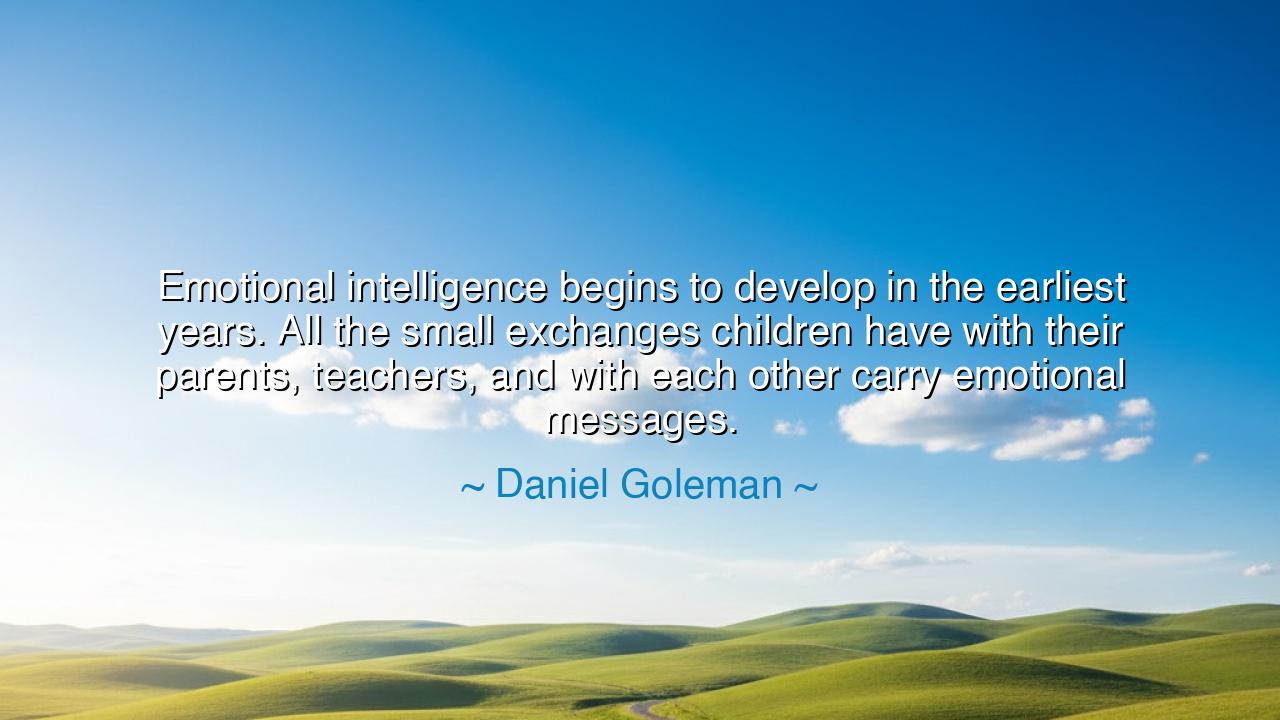
Emotional intelligence begins to develop in the earliest years.
Emotional intelligence begins to develop in the earliest years. All the small exchanges children have with their parents, teachers, and with each other carry emotional messages.






In the quiet wisdom of human nature, the scholar Daniel Goleman gave voice to a truth both ancient and eternal when he said: “Emotional intelligence begins to develop in the earliest years. All the small exchanges children have with their parents, teachers, and with each other carry emotional messages.” In this reflection lies not only the key to understanding childhood, but the foundation of all civilization. For what we call emotional intelligence — the ability to understand, guide, and master the heart — is not learned from books or lectures, but from the tender rhythm of our earliest relationships.
The origin of this thought springs from Goleman’s lifelong study of the mind and the heart. Drawing from both science and philosophy, he revealed that intelligence is not only of the brain, but also of the soul. In the first years of life, before a child can even speak, the world is already teaching him — through smiles and silences, through comfort and rejection — what love means, what safety feels like, and what to do with pain. These countless small exchanges form the invisible script of a human being’s emotional life. Every look of encouragement, every act of patience, every word of kindness becomes a seed that later blossoms into empathy, resilience, and wisdom.
This understanding is not new. The ancients, too, spoke of it in their own language. The philosopher Aristotle taught that to educate the mind without educating the heart is to raise a clever animal, not a human being. The Stoics of Greece and Rome — men like Seneca and Marcus Aurelius — believed that the mastery of emotion was the highest art, the path to both virtue and peace. Goleman’s insight revives these timeless teachings in the modern age, reminding us that intelligence of the heart is the first and greatest education, and that it begins not in the classroom, but in the home, at the cradle, and in the warmth of human connection.
Consider the story of Helen Keller, who was both blind and deaf from infancy. For years she lived in darkness, unable to communicate with the world around her. It was her teacher, Anne Sullivan, who broke through that silence — not merely with words, but with compassion, patience, and love. In the touch of her teacher’s hand, Helen learned more than language; she learned trust, self-control, and empathy. This was emotional intelligence at its most divine — the ability of one heart to awaken another. Their story stands as living proof that emotional understanding, once kindled, can illuminate even the darkest existence.
Goleman’s words also remind us of the delicate responsibility we bear as adults. The way a parent listens to a child, the way a teacher corrects a student, or the way children treat one another — these are not trivial acts. They are emotional messages, shaping the inner world of a soul still in bloom. When we raise our voices in anger, we teach fear; when we listen with patience, we teach respect; when we show forgiveness, we teach compassion. Every gesture, every word, becomes a lesson in how to feel, how to love, and how to live.
In our modern age, where machines speak faster than people and screens replace faces, this truth becomes ever more sacred. For emotional intelligence is what binds community, what prevents the mind from becoming cold and the world from growing cruel. A society that neglects the heart in favor of intellect alone may build great towers, but its foundation will tremble. We must remember that reason guides, but emotion inspires; that intellect may command, but only empathy unites.
Thus, the teaching of Daniel Goleman is both a warning and a promise. If we wish to build a wise and compassionate world, we must begin with the child. To the parents and teachers, let this be your sacred task: be mindful of the emotions you sow, for they will shape the future more surely than any law or lesson. Speak gently. Listen deeply. Model kindness. For in each exchange, you are writing upon the soul of tomorrow.
And to the generations yet to come, remember this: the heart is the first school, and love is its greatest teacher. Guard your emotions not with walls, but with awareness. Learn to read the hearts of others as carefully as you study your books. For intelligence may give you power, but only emotional intelligence will make you whole — and through it, you will learn the greatest wisdom of all: to understand and to love, even in a world that forgets how.






AAdministratorAdministrator
Welcome, honored guests. Please leave a comment, we will respond soon